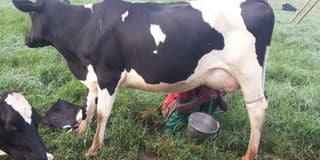Tips on how livestock farmers can improve their herds

Using milking machines instead of manual means saves costs on labour. Photo by Fred Muzaale.
What you need to know:
The farmers had also been advised to embrace the double-muscle cattle breeds, especially those who keep animals for beef.
In a bid to realise their goal of being the leading commercial livestock farmers in the Great Lakes region, 12 representatives of the Renaissance Livestock Farmers Network (RELINE) have undertaken a one-week study tour of livestock farms in The Netherlands.
High quality
During the tour, the group, which was led by Mr Emmanuel Tayebwa, proprietor of Mutanoga Dairy Farm in Lyatonde District, learnt a number of things which they say would help them improve their livestock farming practices and hence their productivity.
Mr Tayebwa explained that among the best practices they learnt from their The Netherlands was how to ensure high levels of hygiene in animal husbandry, if a farmer is to produce high quality dairy products.
Right mix
“Ensuring good animal health through strengthening disease prevention is very important in livestock farming if a farmer is to realise high productivity, which some of us have been underlooking,” he said, adding; “Proper feeding of animals right from calf stage by giving the right nutrient mix at each stage of growth is necessary. A farmer should also have knowledge of the level of feed intake being achieved.”
The other area that the farmers leant was the importance of disease control through ensuring adequate hygiene, being alert to symptoms of disease and complying with requirements when importing animals from other countries.
Herd strength
The farmers said that through their educational tour, they appreciated that though very expensive, livestock farmers need to adopt use of farm machinery like milking machines.
“These machines save labour expenses, reduce dependency on skilled farm workers and enables rearing of larger herd strength. The use of milking machines, increases not only the milk yield but also its quality,” Tayebwa said.
The farmers had also been advised to embrace the double-muscle cattle breeds, especially those who keep animals for beef. These breeds carry a mutation, which represses the myostatin protein consequently enhancing muscle growth and somewhat smaller organs and bones.
“Because of their larger muscles are beyond normal, a farmer gets more money when he sells them compared to the ordinary cattle,” he said.
However, Tayebwa pointed out that the only challenge in double-muscled cattle breed is their difficulty in giving birth naturally. Nine of every 10 of them have to undergo Caesarean sections given the big size of the calf. “Double muscled cattle give birth only twice and they are slaughtered for beef,” he added.
Profitable business
As part of the future plans, RELINE intends to set up their own abattoir in Kampala where the members would sell their cattle from so as to fetch better prices of their animals.




